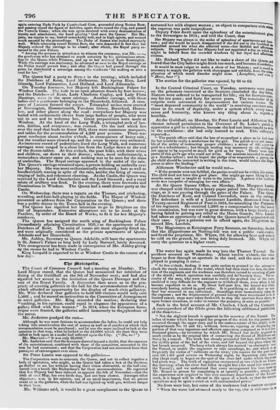rig ifictrapatos.
The Court of Common Council had a meeting on Monday. The Lord Mayor stated, that the Queen had announced her intention of dining at the Guildhall on the 9th of November next ; and had also signified her assent to the invitation of the Queen Dowager and the rest of the Royal Family. A discussion then arose as to the pro- priety of erecting galleries in the hall for the accommodation of ladies ; which afforded an opportunity for the display of much civic gallantry. Mr. Wire declared that galleries to hold 600 visitors would only cost 1,1,00/. ; and he moved an instruction to the Committee of Arrangement to erect galleries. Mr. King seconded the motion; declaring that "nothing. in his opinion, could equal in elegance the appearance of a gallery filled with fine women." In 1814, when the European Sove- reigns were feasted, the galleries added immensely to the,splendour of the scene.
Mr. Anderton grudged the cost—.
Although be was most desirous to accommodate the ladies, he could not help taking into consideration the cost of money as well as of comfort at which that accommodation must be purchased ; and he was the more inclined to look at the question in that way, when he looked at the 24,000/. which the feast they were called to look upon as a model had inflicted upon the City. ("No, no !")
Mr. Marriott—" It was only 22,0001."
Mr. Anderton said that theaccounts showed beyond a doubt, that the expenses of she entertainment, combined with those of the committee, amounted to the Wm he had mentioned ; and that the Corporation had not recovered from that paroxysm of extravagance ever since.
Sir Peter Laurie was opposed to the galleries- The.Corporation were to entertain the Queen, and not to collect together a body of spectators, who might, as the Queen had taken a box at the theatres, go thither to see her without having their vision obstructed, or the hall con- verted into a booth like Richardson's for their accommodation. lie regretted that her Majesty had been induced to appoint the 9th of November—that the 18th of tint May, her own bitth.day, had not been chosen. Amongst other objection,, was, in his opinion, one of uo small importance, that no person could sit in the galleries, when the hall was lighted up with gas, without danger to their (is es.
Mr. Williams said, it would be a great compliment to the Qucen to
surround her with elegant women ; an object in comparison with which the expense was quite insignificant. Deputy Price dwelt upon the splendour of the entertainment dns to the Sovereigns in 1814; and told the Court, that Her Majesty was always in the midst of splendour of apartments and furs' ture ; and she would be much disappointed if she did not in the Guildhall steb assembled around her what she admired more—her faithful and affectioati, subjects. He regretted that her Majesty had not appointed a day on whit:hie might be beheld from the crowded windows by her loyal and affectionate citizens.
• Mr. Richard Taylor did not like to make a show of the Queen, feared that the City ladies might drink too much, and become disorderly,
It would be most vulgar to make a show of her Majesty ; and it would he necessary to supply the galleries with champagne and cordials, from the misip, plication of which much disorder might arise. (Laughter, and criers " Bear, hear !") The motion for the galleries was rdected, by 66 to 62.


























 Previous page
Previous page